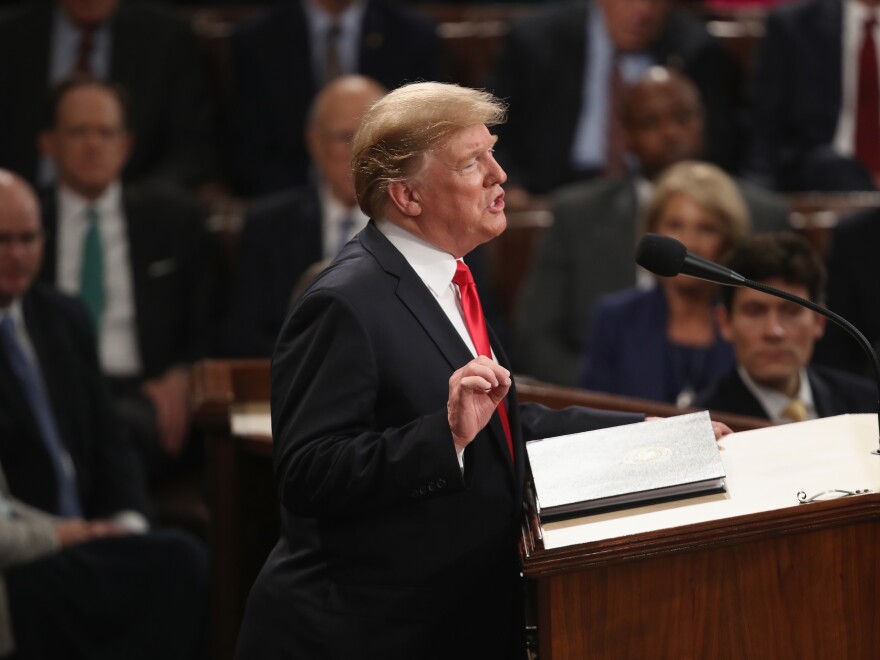Updated at 1:45 p.m. ET
President Trump is set to deliver his third State of the Union address Tuesday night, less than a day before the U.S. Senate is scheduled tovote on two articles of impeachment against him.
While the scene on Capitol Hill has been tumultuous during the impeachment trial, a senior administration official told reporters last week that Trump's address would use "the great American comeback" as its theme and take an optimistic tone.
Here's what you need to know ahead of tonight's address.
What time is the State of the Union?
The speech is set to begin around 9 p.m. ET. You can listen to NPR's simulcast of the speech on NPR.org, the NPR One app or on your local member station. Find your station here.
NPR will also provide live fact-checking and analysis of Trump's address and the Democratic response on NPR.org.
What's Trump expected to talk about?
A senior administration official told reporters that Trump would highlight promises he has kept as president and would highlight the strength of the U.S. economy and military.
Trump is expected to touch on five areas in his remarks.
1. Issues related to the economy, including a Phase 1 trade deal with China, the recently signed USMCA trade deal and Opportunity Zones.
2. A range of family issues, including school choice, paid family leave and expanding access to child care.
3. Lowering the cost of health care, including surprise billing and transparency in costs. Trump is also expected to draw a sharp contrast between his health care plan and that of Democrats.
4. Immigration, including work on the southern border and sanctuary cities.
5. National security.
It's unclear whether Trump will address impeachment during the speech. While the president has slammed the trial in tweets and at his campaign rallies, it remains to be seen whether he will broach the subject during the formal address to Congress.
Who are the guests?
The White House has invited 11 guests to highlight priorities Trump will mention in his speech, some of whom include Tony Rankins, an Army veteran who got a job working in an Opportunity Zone in Cincinnati, and Paul Morrow, an Army veteran who works in an Opportunity Zone in Montgomery, Ala.; Stephanie Davis from Philadelphia, whose daughter Janiyah is on a long wait list for a school; Kelli Hake, whose husband was killed by a roadside bomb in Iraq; Ivan Simonovis, a former police chief from Caracas who escaped prison and now lives in Florida; and Raul Ortiz, the deputy chief of U.S. Border Patrol.
House and Senate Democratic leaders are inviting guests to highlight their efforts to push for legislation to lower prescription drugs and to fight legal challenges that could weaken protections for those with preexisting conditions. House Speaker Nancy Pelosi, D-Calif., released a list of some of her guests that included Dr. Nadine Burke Harris, California surgeon general; and Cheyanne and Morgan Faulkner, identical twins from San Francisco who both have Type I diabetes and have worked as patient advocates.
Who is delivering the Democratic response?
Michigan Gov. Gretchen Whitmer is set to deliver the Democratic response to Trump's speech. She'll speak from East Lansing High School, where her daughters attend.
"Democrats across the country have a plan to improve education, fix our infrastructure, expand and protect health care coverage, and build an economy that works for everyone," Whitmer said in a statement released ahead of her remarks. "Our nation deserve[s] this type of leadership, and we are ready to take action to get it done."
Rep. Veronica Escobar, D-Texas, will give the Spanish-language response.
Copyright 2021 NPR. To see more, visit https://www.npr.org. 9(MDAxNzg0MDExMDEyMTYyMjc1MDE3NGVmMw004))






